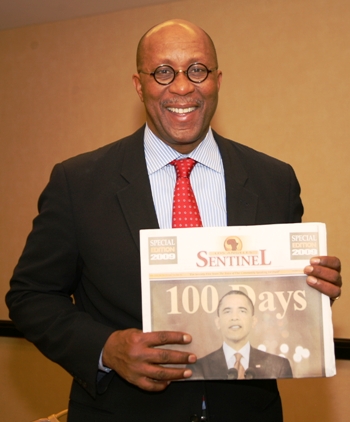Ambassador Ron Kirk, U.S. Trade Representative
  Photo Credit: Shon Smith
The United States is one of the biggest markets in the world and it conducts trade–goods, services and policies–with the rest of the world. The Honorable Ronald “Ron” Kirk is the U.S. Trade Representative who has been appointed by President Barack Obama to represent the United States in matters of trade throughout the world. He holds the title of ambassador, a cabinet level position.
Ambassador Kirk has a very colorful career both in the private sector and in government. He practiced law in Dallas, Texas, before working with the late Senator Lloyd Bentsen and Governor Ann Richards of Texas. He was the first African American mayor of Dallas.
On his way to South Africa to represent the President at the inauguration of the new president, the Honorable Jacob Zuma, he made a brief stop in Los Angeles and spoke with the Los Angeles Sentinel about his trip, his new post and its responsibilities.
LOS ANGELES SENTINEL (LAS): “Welcome to Los Angeles, Mr. Ambassador, on behalf of the publisher of the Los Angeles Sentinel, we consider it an honor for you to spend this time with us to let our readers know the details of the office of the U.S. Trade Representative. Tell us, what is your exact title and what it entails?”
AMBASSADOR RON KIRK (ARK): “I am the United States Trade Representative within the office of the president and it is cabinet level status with the rank of ambassador.”
LAS: “What is your present assignment….your mission when you leave here?”
ARK: “Actually, I’m leaving here to go to South Africa to represent President Obama and the United States at the installation of Jacob Zuma as president of South Africa and when I leave South Africa, I will go to Geneva, the home of the World Trade Organization (WTO) which is our governing body for the global trading community similar to the United Nations. It’s been around for about 40 years and is the governing body for our trade as a successor to the general agreement on tariffs and trades.
“I think the biggest misperception about our job is that we do more trade promotions or lead missions in the sense that Mayor Villaraigosa or Mayor (Willie) Brown did or how the mayors go out and promote investments. My position is the lead negotiator for the United States. Anytime we look to create additional markets for America’s goods, services, products, agriculture and we are in the business of negotiating with another country over the terms by which we’ll allow their goods and services here or that we’ll be allowed to export to that country–that comes under the purview of the United States Trade Representative’s office.”
In addition to the above listed areas of responsibilities, the enactment of Section 182 of the Trade Act has expanded the trade representative’s role to include intellectual property laws worldwide and to monitor efforts by other governments to protect intellectual property rights.
LAS: “What role do the hemispheric trade agreements play relative to the U.S. strategy in pursuing multiple market-opening initiatives on a global, regional or bilateral basis?”
ARK: “We have the responsibility for monitoring all of our existing trade agreements like NAFTA (North American Free Trade Agreement), the CARICOM (the Caribbean Community) and the Caribbean Basin Initiative–all our bilateral investment treaties that we might have with a single country or with a broad range of countries–all of that fall within the purview of our office.”
LAS: “Is there anyone from the L.A. area who is accompanying you on the trip to South Africa?”
ARK: “No, on that trip, I’m representing the President and the United States. I’m going and my assistant U.S. Trade Representative who handles all of our African affairs is traveling with me. I also understand that Congresswoman Barbara Lee who chairs the Congressional Black Caucus (CBC) was invited separately by the South African government; so she and one or two members of the CBC may be in attendance as well.”
LAS: “What I really mean is: in the permanent staff of the U.S. Trade Representative’s office, is there anyone from the L.A. area?
ARK: “The point I was trying to make is that when we travel, we do not travel as a delegation. We are literally the lawyers, the negotiators and I am the ambassador who negotiates on behalf of the United States. Instead of business to business, our negotiations are vis-ˆ-vis government to government. The trade missions are principally led by commerce (the Department of Commerce). When our friend and brother, Ron Brown, was Secretary of Commerce, he would lead commercial trade delegations all over the world. But when I go, I’m going with the express purpose of sitting down and meeting with my counterpart who’s typically at a ministerial or ambassador level.”
LAS: “So let’s say that a chain store wants to open another store in Beijing, how does that work?”
ARK: “That’s a whole different department. Our office will not be involved in a chain store that wants to make a commercial, retail investment. However, trade is critically important to the State of California and all of the West Coast; Los Angeles is a microcosm of the world representing every language, every culture and every dialect and that’s why we’re here. Los Angeles has been promoting its ability to create jobs here by being involved in export/import relationships since early 1900s; we’re here as part of World Trade Week which is celebrated by the city and your Chamber of Commerce, and is what brings us to town.
“But we are in the middle of a serious health crisis in our country with this H1N1 virus.
Regrettably, it is referred to as the swine flu but it really has nothing to do with swine. You can’t get it from eating pork and you can’t get it from being around pigs. But because of the unknown facts and the fear about the virus, a number of countries have used a legitimate health crisis to call for a ban on pork products from Mexico and certain states within the United States. That has the potential to turn a very serious worldwide health crisis into a much more severe economic crisis when we are already dealing with a global economic crisis that has manifested itself in the 16 percent drop in global trade which can have a disastrous effect on smaller nations. So in this case, my office is directly involved in working with the Department of Agriculture and others in reaching out to Russia and other countries, and saying that the actions you’re taking are in direct violation of the principles of the WTO.
“That’s the level of engagement my office is involved in.”







